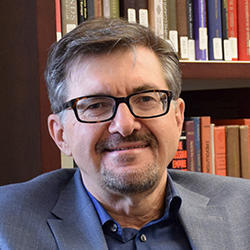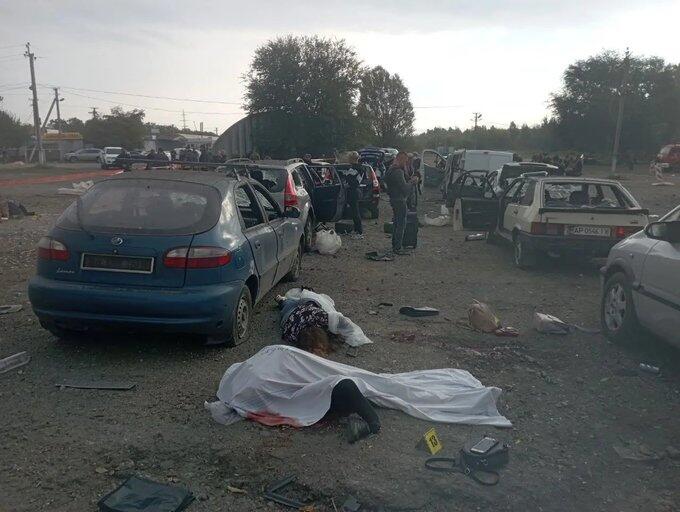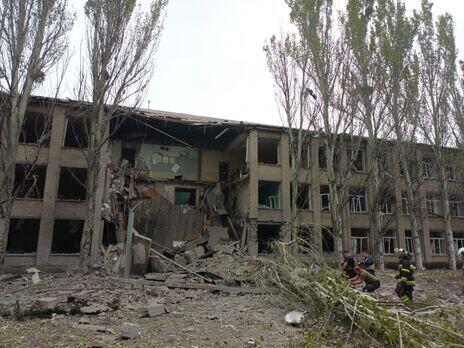Russia’s Illegal Annexation of Ukrainian Territory: Experts Respond
On Friday, September 30, 2022, Russian President Vladimir Putin signed four accession treaties declaring that the Donetsk, Luhansk, Kherson, and Zaporizhzhia regions of Ukraine are now a part of Russia. This move, which forcibly claims 15% of Ukraine’s territory, follows a series of sham referenda wherein citizens were forced to vote (yes) on the question of whether they wanted to join Russia. HURI joins the international community in absolute condemnation of this action, which violates international norms and escalates the months-long brutal, unprovoked war.
During the accession ceremony, Putin delivered a speech imbued with vitriol against the West, indicating that he will protect Russia’s territorial claims even if he must use nuclear weapons to do so. In response, Ukrainian President Volodymyr Zelensky has officially submitted Ukraine’s application to join NATO and asserted that there will be no peace talks with Russia so long as Putin is in power.
Here, we’ve rounded up responses from HURI experts, who reflect on the significance of this development and what it might mean for the future of the war, Ukraine, and Russia. We’ve also collected some Twitter threads by experts who shared remarks on the annexation announcement. We will add to this page as more responses come in.
Oxana Shevel: State sovereignty replaced by the law of brute force and nuclear blackmail
In another round of escalation, Putin today announced the annexation of four Ukrainian regions, following sham “referenda” on independence staged under Russian guns in these regions last week. The annexation constitutes the largest forcible takeover of territory in Europe since WWII, with annexed territory measuring some 40,000 square miles – about 15% of Ukraine’s total area, equal to the size of Serbia or Portugal. The annexation constitutes a new round of escalation by Russia in its war on Ukraine, but does not change the facts on the ground.
First, Ukraine neither recognizes the annexation, nor has any intention to change its military strategy in the war. The Ukrainian leadership has long maintained that Putin has no intention to engage in meaningful negotiations or withdraw troops from any territory Russian seized, and that Ukraine will fight to liberate all occupied territory. The annexation announced today should prove to everyone who may have entertained hopes of a compromise with Putin that no compromise is possible and the outcome of the war will be decided on the battlefield.
Second, Putin’s blatant imperialistic land grab should be prompting western states to both impose tougher sanctions on Russia and increase military assistance to Ukraine. Ukrainian armed forces proved more than capable of effectively using western weapons, the resolve of the Ukrainian army and society to stand firm in the face of Russian aggression has not wavered, and Ukraine’s battlefield successes, most recently in the Kharkiv region, show that the military defeat of the Russian invasion is not only desirable but possible.
In light of the above facts, Ukraine’s formal application for NATO membership made today should be given serious consideration. By attacking Ukraine when it had no realistic chance to join NATO (and subsequently not reacting when Finland and Sweden moved to join the alliance, and even moving Russian troops away from borders with NATO to fight in Ukraine) Putin himself invalidated the argument that NATO expansion is the “existential threat” to Russia and the main cause of the war. Instead, Putin seeks to dominate Ukraine to realize his imperialistic vision of “true” Russia, and to remake the post-WWII international order where norms of state sovereignty and equal rights of all states would be replaced by the law of brute force and nuclear blackmail. The world must be clear-eyed about the real causes of the war, the danger Putin poses not just to Ukraine but to the international regime established after WWII to maintain peace between states, and must stand with Ukraine to prevent Putin from realizing his dangerous delusions fueled by imperialism and conspiracy theories of western plots against Russia.
Serhii Plokhii: The beginning of the end of Putin’s regime—and perhaps of Russia’s territorial integrity
In Russia’s actions, we see a complete disregard of international norms. Putin’s speech today went further than any previous pronouncement in terms of rejecting international norms and international order. He claimed that the current order was created by imperialism and imperial powers who are trying to maintain the semicolonial control of the United States. The cynicism and the irony, of course, is that Putin is running an imperial war trying to reclaim control over Ukraine.
Putin’s illegal annexation of Donetsk, Luhansk, Kherson, and Zaporizhzhia is first and foremost a sign of weakness and failure. It also indicates that Putin is ready to escalate the war. At the same time, this action is potentially the beginning of the end of the regime, and possibly the end of Russia’s own territorial integrity.
The sham referenda indicate that Putin is losing the war and things are not going as intended. The first time we started to hear about a referendum was in May, when the plan was to fully capture the Donetsk and Luhansk regions. The referendums were postponed again and again. They have now taken place, but at a time when Ukrainian forces are encircling more than five thousand Russian troops near Lyman in the Donetsk region. The largest city in Zaporizhzhia is solidly under Ukrainian control.
The annexation tells us that Putin has decided to escalate the war. The immediate plans are clearly to use the mobilization, including the male population of the occupied territories, to stabilize the front lines and to stop the Ukrainian counter offensive. Putin also referred to the nuclear option; the annexation gives Russia a pretext for nuclear warfare. At this point, I don’t think the danger of a nuclear attack is high. Had that been the plan, Putin would not have needed to mobilize, which turned out to be politically costly and problematic for the regime. My reading is that Plan A is to use the mobilization to stabilize the front lines, and potentially in the future, to go on the offensive.
Moscow’s lack of control over part of the territory it now considers its own also opens a legal door for the possible disintegration of the Russian Federation, and not only in terms of these parts of Ukraine. Now that Russia can’t control what it considers to be its territory, some constituent parts of the Russian Federation can join the “uncontrolled territories” category. The Russian Federation’s national republics and regions, which have strong ethnic identities, have already seen large protests in response to mobilization. Zelensky has addressed the Russian national minorities directly, encouraging them to fight the regime.
Putin is possibly trying to bind the hands of the current (and future) political institutions in Russia to stay committed to the annexation of the Ukrainian territories after he leaves the office, securing his role in history as the “gatherer of the Russian lands.” But in reality, the annexation will lead to the further isolation of the regime, and thereby accelerate the process of its fall.
The impact of the annexation on the lives of residents is still unfolding, and it’s hard to get a true sense of how people are responding. There is clearly punishment that comes with dissent in the occupied regions, so we are getting a distorted picture. Overall, however, people are scared. They want the warfare to end, and at this point many of them would likely welcome a settlement that would stop the bombing of their homes.
On Thursday night, there was a major attack on a civilian convoy in my hometown of Zaporizhzhia, with thirty people killed and eighty-eight wounded. The victims were attempting to cross the frontline to pick up relatives and transport them out of the region. By bombing this convoy on the eve of the annexation, the Russian military is sending a signal that they’re closing the border. They’re not letting people leave the occupied territories. The war has changed, as has the people’s ability to travel back and forth. On the Russian side of the frontline, we are now dealing with hostages.
Clearly, after what happened, Ukraine doesn’t have any reason to hold back its desire to join NATO. The ball is now in the court of the NATO leadership, but it seems that Ukraine will be part of NATO sooner rather than later. The immediate response from President Biden is that the US will stand by Ukraine, and he will continue providing help to Ukraine to defend its territorial integrity and sovereignty. The annexation is not recognized internationally, and I think we’re likely to see increased support for Ukraine from the NATO allies.
Olha Onuch: Putin speaks to the ‘global south’
Many experts in Europe and North America watched Putin’s speech live. Some followed the “live tweet” commentary by all flavors of twitterati (including Russians condemning it), and some even felt the need to immediately speak with Ukrainian family members (at home in Ukraine and abroad). Whilst this speech was horrific in many ways—for it was attempting to justify the illegal annexation of Ukrainian territory and tragic violence perpetrated against Ukrainian citizens who did nothing more than stay in their home towns and villages as the Russian army began its all-out invasion on February 24, 2022—live tweeting it also helps spread Putin’s message one way or another, even if folks are trying to debunk his claims, and even if they make it clear that it is all part of some alternate reality vision, one that collides sharply with any factual account. That being said, it is still our job as social scientists to analyze it, consider its purpose, and think carefully about its intended audiences.
I would suggest that this was not a speech targeting a Ukrainian or predominantly ‘western’ audience. Today’s speech might have had moments targeting ‘true believers’ and the hard core of nationalists in Russia, and it may have also attempted to gain nodes of approval from certain segments of ‘western’ society who have an ideologically limited view of entities like NATO. But in my understanding of the tone and substance, this was a speech in large part trying to mobilize ideas around coloniality and empire—with the core of target audiences being in the so-called global south (even if not acknowledging its diversity). In the speech Putin places Russia and this ‘rest of the world’ on one side and the monolith ‘west’/NATO/Anglosaxon hegemonic power on the other. Putin’s speech attempts to justify invasion, war crimes, illegal annexation, and the moving of state borders as a reaction to a false and even imagined version of colonialism of his ‘enemies.’ Let us be clear, there is no justification for such violations of human rights and international law.
Nonetheless, it is our job to ensure that those people who live in countries which (again in a crude and monolithic like manner) belong to a collective ‘global south’ know that in eastern Europe and central Asia it is Russia which was THE colonial and imperial power historically. Moreover, we must make clear that in contemporary times, specifically in the last three decades, Putin’s Russia has sought to be the political, economic, and cultural hegemon imposing its policy preferences, its world view, and its language and culture on the peoples of the countries in these regions. To this end, Russia has used military means and violence to impose these preferences on politicians and ordinary people in neighboring countries if they did not abide immediately. Ukrainian citizens, like many other citizens of neighbor states, have been repeatedly threated and imposed on by Russia’s hegemonic ambitions—and when they moved away from or challenged these Russia-centric views, deciding that other policies (like a preference for joining the EU) or ways of governance (a deeply civic and engaging form of democracy) suited them better, Putin’s Russia reacted with force. The only truly colonial ambitions and actions seeking to rebuild an empire were demonstrated in full force today—by a forced, violent, and illegal annexation of territory by the Russian Federation. And it is the likely the hope of millions of Ukrainians today that those who live in countries around the globe who personally know of the hardships endured as a result of violent colonialism see that they have more in common with Ukraine than they ever did with Putin’s Russia.
Twitter Threads
Kimberly St. Julian-Varnon
Something I’ve noticed: Western media covering today’s formalization of Russia’s forced and illegal annexation of four regions in Ukraine. They forget to note that when happened in 2014, Europe and the US tried to enforce the Minsk Accords, reifying Putin’s lie. They all mention and kinda joke about this “annexation,” knowing that it is illegal. However, the West indulged Putin in his violent fantasies until the lead up of Feb. 24th. Trying to enforce the Minsk Accords, based on this lie of pro-Russian needs in Luhansk & Donetsk. Will we see Western leaders come to an understanding of what it meant to enforce Minsk? To recognize their want for cheap oil and gas stamped the playbook Putin is following today? He’s literally doing what he did in 2014, with Minsk expectations. The difference b/t 2014 & now—Ukraine is fighting back and causing damage to the Russian onslaught. What remains to be seen is if the winter & energy/inflation crises will lead us back down the Minsk road. Ukraine will fight to retain its full territorial sovereignty.
Maria Popova
In my opening remarks in the Senate today, I emphasized that the goals of the sham referenda and expected annexation decrees are to: 1) signal to Ukrainians in the occupied territories that Russia is there forever and they should submit to its authority; 2) force the West to pause and reconsider its support for Ukraine for fear of escalation. I then argued Canada should help thwart both goals by continuing and, even strengthening, its military and financial support for Ukraine. Putin understands force.
Daria Kaleniuk
As a result of sham referenda Putin is performing absurd ceremony on signing “decrees” on annexation of Ukrainian territories. Here is how his troops «greeted» civilians on these territories just within last couple of days:
Zaporizhzhia oblast – this morning Russian troops attacked hundreds of civilians in a humanitarian convoy killing 23 and wounding 28.
Donetsk oblast – 8 people were killed due to a shooting in Dolyna, Sloviansk, Voldiane, and Shevchenko cities. 909 dead and 2288 wounded since the full-scale invasion.
Luhansk oblast – Russia lies that 1.6 mln people took part in “referendum” in oblast with 98.42% voting for joining Russia. Yet in 2012 elections to Ukrainian parliament 1.8 mln people were included in the voter lists of Luhansk oblast, with 320,000 leaving in 2022.
Kherson oblast – Russian occupiers shelled five settlements, leaving people without water and electricity.
The only way to finish these atrocities is to ensure that Ukraine has enough arms and capacities to win the war. #ArmUkraineNow with modern NATO tanks, 4th generation of fighter jets, air defense systems, artillery, armored vehicles
Oleksandra Matviichuk
You asked why Putin implemented this organized hypocrisy and mockery against people in occupied territories. Fake referendums are not legal procedure, but informational special operation. When I see how world media report about it, I start to believe that he can achieve his goal.
https://huri.harvard.edu/russias-illegal-annexation-ukrainian-territory-experts-respond





